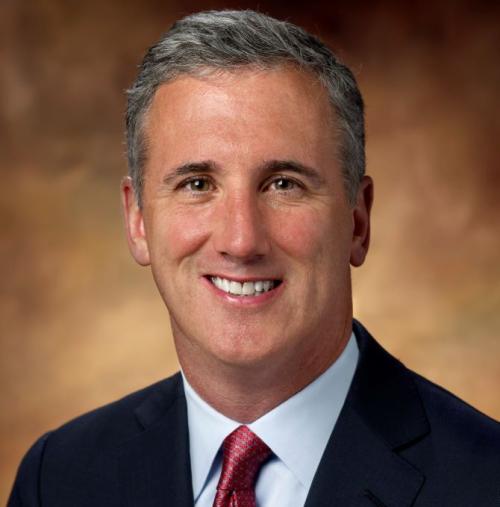Steven Shapiro talks about life as the lone member of a legal department
'I would have loved to play centerfield for the San Francisco Giants, but you have to be able to hit,’ laughs Steven Shapiro, general counsel and corporate secretary at ColeTaylor Bank. ‘Once you realize you can’t hit, what comes next? Rock star.’
Shapiro wasted little time entertaining alternative career options, however. By high school he knew he wanted to be a lawyer. ‘Sad, isn’t it?’ he jokes. Following college and a two-year stint in finance, Shapiro enrolled in law school and has practiced law in varying capacities ever since. ‘I know it sounds nerdy, but I get great satisfaction from identifying legal issues as far in advance as possible and solving them proactively,’ he says.
Shapiro joined ColeTaylor Bank in March 2009. The lone member of the firm’s in-house team, he oversees all legal matters, provides counsel – both legal and governance-related – and takes care of the securities work. Prior to his appointment, Shapiro’s position had been vacant for several years, so an initial hurdle entailed educating his new colleagues that lawyers do actually serve a vital function.
Shapiro had no trouble providing some compelling evidence. One example, which he says ‘gets a lot of mileage among my lawyer friends’, involved a contract between the bank and a vendor. When issues arose between the two parties and the bank wanted out of the agreement, Shapiro received a surprising call from the opposing counsel. ‘Are you sure you want to fight this?’ the lawyer asked. ‘Because you are paying our legal fees.’ Indeed, the bank employee who had originally entered into the contract had overlooked a provision stating that, in the case of legal action, the bank would pay the opposing party’s legal fees, regardless of the outcome. Now Shapiro approves all contracts.
The ins and outs
Shapiro also manages outside counsel. When he joined ColeTaylor, one of his first tasks was to slash the firm’s legal expenses – a tall order for a one-man shop. In order to fulfill his myriad responsibilities, Shapiro must outsource certain services, yet over the past year he has managed to reduce both the fees charged and the number of law firms used.
One of the crucial steps in cutting costs ‘is to establish myself as a sophisticated legal consumer,’ Shapiro explains. ‘There is still a bias among those at law firms that in-house lawyers are not as well informed.’ Additionally, firms may need to be reminded that it is a competitive market. ‘The worst thing a law firm can think is that just because it has done work for a company in the past, there is no competition,’ Shapiro adds.
Successfully managing relationships with outside counsel also requires vigilant, proactive oversight and aggressive bill review. Do not be afraid to challenge an invoice, Shapiro advises. ‘If I get billed for something I think a paralegal should have done, I will not pay the full bill,’ he says. When it comes to block billing, outside counsel ‘cannot simply bill ColeTaylor for eight hours,’ he adds. ‘The firm must specify what it did in those eight hours.’
Shapiro is unconvinced viable alternatives to the billable hour have been found, and feels the extent to which law firms have agreed to pursue alternative structures may be overstated. ‘It’s hard to believe the revolution has come,’ he says. ‘If a lawyer has been billing his time for 25 years, this won’t change overnight because Microsoft, for example, has pressed law firms to change billing structures.’
All things to all people
In-house, everyone relies on Shapiro for legal counsel in some form or another. As a result, he interacts with a wide range of departments, including human resources, finance and the internal auditor. He dedicates a fair amount of time to employment-related issues. ‘Anybody who manages people needs to understand the employment laws,’ he says.
In November 2008 ColeTaylor received Troubled Asset Relief Program funds, so Shapiro often addresses questions about the new regulations, particularly as they apply to compensation. Unfortunately, ‘compensation implications are not always easy to discern,’ he says. ‘Although I must give the Treasury credit for being absolute: you cannot pay certain people bonuses. That is pretty darn clear.’
In the secretarial function, Shapiro’s responsibilities include counseling the board, and he underscores the importance of keeping directors happy. ‘Board members may not be able to make you, but they can certainly break you,’ he cautions. Another piece of advice he offers is this: if you do not know the answer, say you do not know. ‘The alternative is to give advice you don’t know is right, and that can get you fired,’ he warns.
Providing governance and compliance counsel at a smaller company offers some interesting challenges. ‘In some organizations our size, the entrepreneurs are still around,’ Shapiro says. These are individuals who, Shapiro points out, ‘made their money hearing folks telling them, You can’t do that, and then going ahead and doing it anyway.’ While that may be a productive trait from a market standpoint, it’s not so appealing ‘when you are talking with them about compliance.’
It’s hardly surprising that the question Shapiro frequently hears in these circumstances is: do we really need to do this? He understands the sentiment and can sympathize with it, particularly when it comes to the SEC’s new climate change disclosure regulations. For ColeTaylor shareholders and others in the financial sector, it really isn’t a very important issue, and this raises another question for Shapiro: ‘What am I not spending time on so I can spend it on this?’
From a shareholder perspective, Shapiro is also concerned that filings are becoming too laborious to get through, so as a result nothing leaps out as being especially important. On the upside, one possibly overlooked benefit of working at a smaller company, Shapiro says, is that there is less pressure for precise compliance the first time around. ‘Sometimes you get a break because you fly under the radar,’ he explains.
So how does Shapiro get everything done? ‘I sometimes ask myself that,’ he admits. The bottom line is that he puts in the time. As far as finding the elusive balance between life in and outside of work goes, his approach boils down to this: no matter how much you love your job, it does not love you back.








